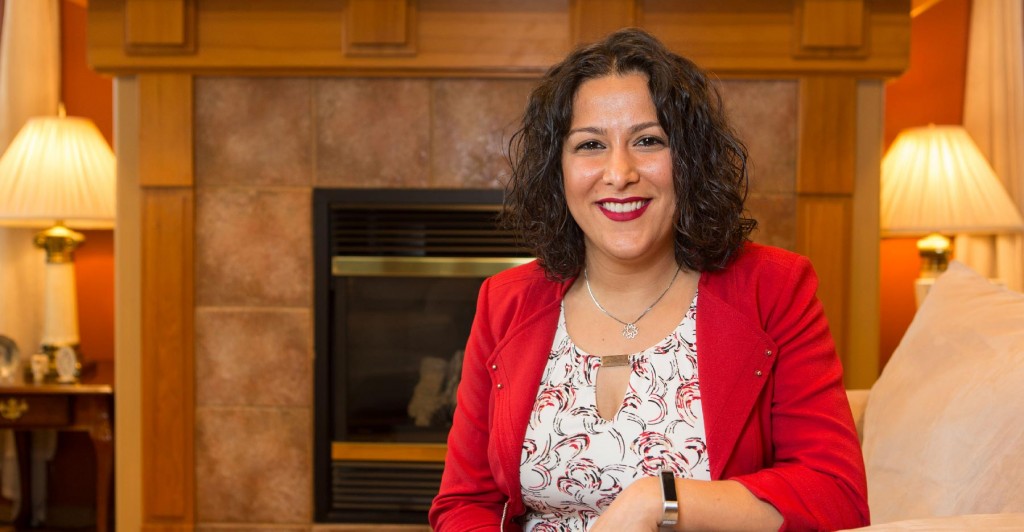Page 89 • (982 results in 0.204 seconds)
-
concept that at the time was unheard of. “What we take for granted as public education, which is supported through taxes, is a Luther invention,” he said. But Torvend argues perhaps the most important Lutheran innovation in education was allowing every subject to exist independently. “That meant that professors in religion could not tell professors in geology or biology how to go about the study of their discipline; it meant that professors in psychology could not tell professors in English how to go
-

,” she said. “I understand a lot of things they have experienced.” Sabet-Kazilas says gaining graduate-level admission to PLU represented years of hard work and resilience. She graduated in 2008 with a degree in psychology from the Baha’i Institute for Higher Education, which was founded in 1987 in response to the Iranian government’s campaign to block Baha’i followers from pursuing higher education. She earned a bachelor’s degree despite a lifetime of intimidation in Iranian primary schools. “With
-

background. Her mother never made her or her siblings feel like they went without, and inspired them to speak success into existence. That upbringing taught Rojas Apodaca to take ownership of her future, and informs her continued path toward law school. “She was always very motivating, and I think that transcended into my own motivation,” Rojas Apodaca said. “She’s a really good role model for me.” Cristina Flores ’19, who is majoring in psychology with a minor in Hispanic studies, says her first
-
began supporting schools through taxes, a concept that at the time was unheard of. “What we take for granted as public education, which is supported through taxes, is a Luther invention,” he said. But Torvend argues perhaps the most important Lutheran innovation in education was allowing every subject to exist independently. “That meant that professors in religion could not tell professors in geology or biology how to go about the study of their discipline; it meant that professors in psychology
-
Procedures Against Women in Auschwitz: An Unspoken Narrative” Who: Peggy J. Kleinplatz, Ph.D. Bio: Dr. Peggy J. Kleinplatz is Professor of Medicine, Clinical Professor of Psychology and Director of Sex and Couples Therapy Training at the University of Ottawa. She is a clinical psychologist, Board Certified in Sex Education and as a Diplomate and Supervisor of Sex Therapy. In 2015, Kleinplatz received the American Association of Sexuality Educators, Counsellors and Therapists’ Professional Standard of
-
majoring in English–creative and professional writing–as well as Gender, Sexuality, and Race studies, and minoring in psychology. Eden grew up in Tacoma and as such has developed the weird and gritty personality that comes with living here. For Eden, weirdness translates to embracing the singularity of their unique experience, and grit translates to passion and powerful attention. These factors have driven their work as an editor with PLU’s literary arts magazine Saxifrage, which publishes student
-
) o STAT 231: Introductory Statistics (4) OR STAT 232: Introductory Statistics for Psychology Majors (4) o KINS 277: Foundations of Kinesiology (2) o KINS 324: Physical Activity and Lifespan (4) or KINS 386: Social Psychology of Sport and Physical Activity (4) o KINS 380: Exercise Physiology (4) o KINS 383: Exercise Testing and Prescription (4) o KINS 478: Motor Learning and Human Performance (4) o KINS 483: Clinical Management for Special Populations (4) o KINS 486: Applied Biomechanics and
-
1 CURRICULUM VITAE ANISSA TAUN ROGERS September 2022 Professor, Social Work California State University San Bernardino 5500 University Parkway San Bernardino, CA 92407 909.537.7529 anissa.rogers@csusb.edu EDUCATION 1997 Ph.D.: University of Utah Graduate School of Social Work Gerontology 1997 M.S.W.: University of Utah Graduate School of Social Work Health/Mental Health Administration 1993 M.A.: Ball State University Counseling Psychology 1990 B.A.: University of Utah Psychology Spanish
-
students’ working relationship with faculty members helps students become entrenched in their studies. Through student-faculty research, students incorporate their own experiences with academia in a way that Lewis says improves critical thinking, writing and understanding of students’ subjects of interest. Cynthia Waite '20 Waite’s project, a study of faculty-student mentoring, caught the spirit of the day. Psychology Professor Wendelyn Shore, an expert on the topic, was Waite’s mentor, and was
-
Policy PHYSICAL EDUCATION PHED 324: Lifespan Physical Activity & Health PHED 366: Health Psychology PHED 384: Health and Fitness Promotion PHYSICS Physics 125: College Physics I* Physics 126: College Physics II* Physics 153: General Physics I* Physics 154: General Physics II* * Sometimes instructors assign problems about efficiency of appliances, cost to run a car, etc. Additional class: Energy (J-term class 2011) PHILOSOPHY Phil 125: Ethics and the Good Life Phil 225: Business Ethics Phil 226
Do you have any feedback for us? If so, feel free to use our Feedback Form.


